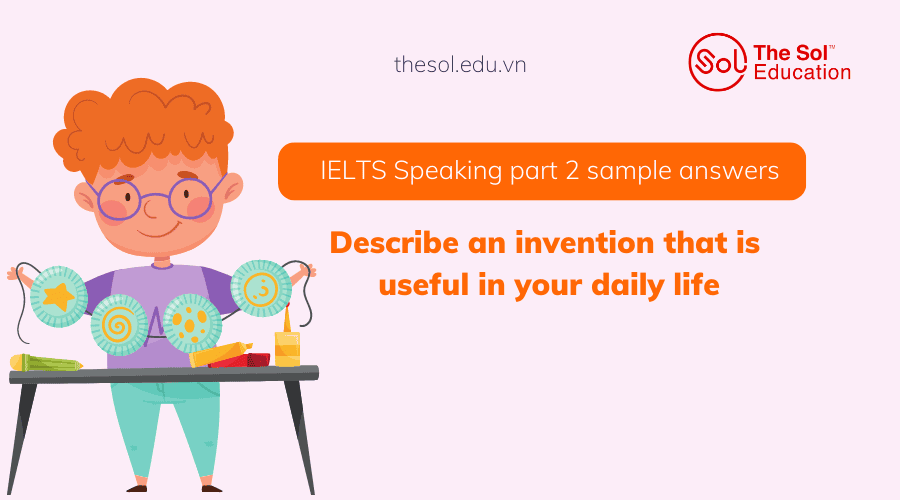Câu trả lời tham khảo IELTS Speaking part 2: Describe an invention that is useful in your daily life (Miêu tả một phát minh hữu ích trong cuộc sống hàng ngày của bạn.)
>> Dự đoán đề IELTS Speaking Quý 2 năm 2023 (tháng 5,6,7,8 năm 2023) kèm đáp án tham khảo

IELTS Speaking part 2 sample answers: Describe an invention that is useful in your daily life
You should say:
2. Tìm hiểu về invention:
Tóm tắt lại những gì đã nói về invention này.
Nêu lại lý do vì sao bạn nghĩ invention này quan trọng đối với cuộc sống của mình.
When asked to describe an invention, most people would say the computer, but in my opinion, that is a bit boring. There are other inventions that are just as important and essential in our daily lives, such as the refrigerator.
While it's easy to take the refrigerator for granted, it has literally transformed the way we live. One generation ago, not everyone had a refrigerator, and two or more generations ago, they didn't even exist. Imagine living without a means of effectively storing perishable food for days - it may sound simple, but the refrigerator has made a huge difference in our homes and saves us a tremendous amount of time. In particular, the refrigerator can keep food fresh for days, especially during hot weather when perishable items like meat and fish can spoil quickly.
It's worth noting that the use of refrigerators has significantly reduced the number of food-related illnesses. When a piece of meat or fish is taken out of a cold environment, it can quickly become a breeding ground for bacteria. If you eat such food, the chances of getting sick increase significantly. Properly refrigerated and stored food has been a game-changer for humanity.
Today, refrigerators are not just popular, they are ubiquitous. It's hard to imagine life without a refrigerator, and many families even own two fridges. They are also easy to use - you simply plug the refrigerator into an electrical outlet, and it will work using a mechanism and a special motor that keeps the interior cool. All you need to do is set the temperature correctly. It's an item that anyone can use without any hassle at all.
Sample answer 1:
"As far as I can tell, inventors need a lot of creativity and open-mindedness. First of all, they have to think beyond conventional ideas and come up with solutions others haven’t thought of. On top of that, they need resilience, as inventing often involves a lot of trial and error. For instance, if they’re not persistent enough, they might give up at the first sign of failure."
Sample answer 2:
"To my way of thinking, inventors must have a deep curiosity and a passion for problem-solving. From the outset, a strong curiosity pushes them to explore new areas and constantly ask questions about how things work. Another thing is discipline, as developing something new usually takes time and focus. Without these qualities, I doubt they could follow through on complex projects."
Sample answer 1:
"The way I see it, anyone with a good idea and determination can create something new, not just scientists. Many inventors start with a simple idea and experiment on their own. To name one example, Steve Jobs wasn't a scientist, but he revolutionized technology with the creation of the iPhone and other devices."
Sample answer 2:
"My take on this is that scientists do have an advantage because they possess specialized knowledge that can lead to more groundbreaking inventions. With that being said, having a scientific background can certainly make the process of inventing easier or more structured. However, I do believe creativity and innovation aren't limited to scientists alone."
Sample answer 1:
"As far as I’m concerned, governments should take responsibility for sponsoring inventors, especially those working on projects that could benefit society as a whole. For starters, government funding can ensure that the inventions align with public interest, like in the fields of healthcare or environmental technology. More importantly, it’s also more transparent, so the funding process may be less profit-driven."
Sample answer 2:
"To my way of thinking, private companies are actually better suited for supporting inventors. They often have the resources and expertise to help bring inventions to market more quickly. And come to think of it, companies have the potential to innovate further by collaborating with inventors, which can lead to more rapid advancements. So, in a way, private sponsorship might be more efficient."
Sample answer 1:
"What I reckon is that not all inventions benefit society, as some can have unintended negative consequences. For example, plastic was a revolutionary invention, yet it’s now causing environmental issues on a massive scale. I’d go as far as to say that each invention should be assessed for its long-term impact before it’s widely adopted."
Sample answer 2:
"The way I see it, most inventions do bring some kind of benefit, even if they have drawbacks. Take social media, for example. While it can lead to issues like reduced face-to-face interaction, it’s also a powerful tool for connecting people globally. Mind you, I think it’s up to society to use these tools responsibly so that the benefits outweigh the harms."
Sample answer 1:
"As far as I can tell, renewable energy technologies like solar panels and wind turbines have truly made the world a better place. They offer cleaner energy alternatives that can reduce pollution and fight climate change. More specifically, they’ve empowered communities in remote areas to access electricity sustainably, which I find impressive."
Sample answer 2:
"To my way of thinking, advancements in medical technology have had a huge positive impact. For instance, things like MRI scanners or minimally invasive surgery tools have made diagnosing and treating diseases much easier and safer. These inventions have saved countless lives and will continue to improve healthcare around the world."
Sample answer 1:
"My take on this is that electric vehicles have a lot of potential but still need improvements. For starters, their battery life and charging infrastructure could be enhanced. This would make them more practical for everyday use and encourage more people to switch from traditional cars, which could help the environment."
Sample answer 2:
"What I reckon is that recycling technologies could use some upgrades. With that being said, current methods often aren’t efficient enough to handle the scale of waste we produce. More advanced recycling techniques could make a big difference by reducing landfill waste and conserving resources more effectively."
Xem thêm các bài mẫu IELTS Speaking part 2 để lên ý tưởng cho bài nói của bạn nhé!
